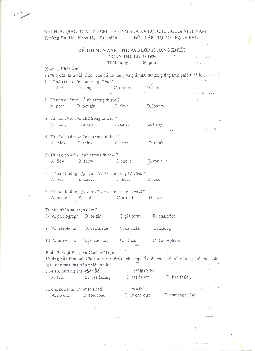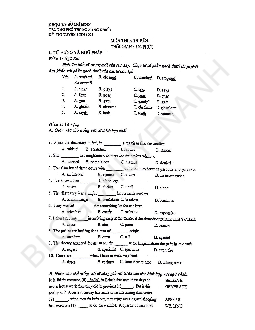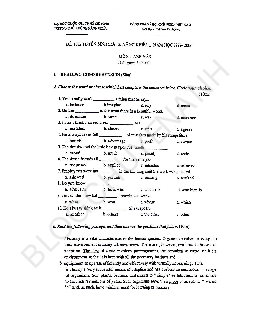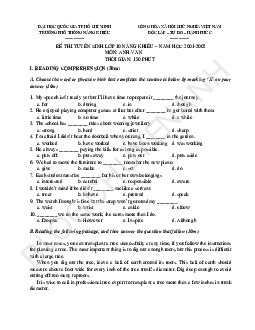


Preview text:
ĐỀ BÌNH ĐỊNH
Part 1: Complete each blank with ONE given word. There are more words than needed. (1,5 m)
1. Leonado Dicapro is a talented actor; However, he only won an Oscar after six nominations. However: tuy nhiên
Leonardo Dicaprio là một diễn viên tài năng; Tuy nhiên, anh chỉ giành được một giải Oscar sau sáu lần được đề cử.
2. Travel ers who cross the Atlantic from New York to London often suffer from jet lag for a few days.
‘who’ Làm chủ ngữ hoặc tân ngữ, thay thế cho danh từ chỉ người.
“who” thay thế cho “travellers”
3. It would be easier for us to master English if there weren’t so many words.
Câu điều kiện loại 2: được sử dụng để diễn tả những tình huống không có thật, không thể xảy ra
trong tương lai và giả định kết quả nếu nó có thể xảy ra.
If + S + V2/-ed, S + would/could/... + V
4. Eat more vegetables and fruits. You’l be healthy.
More /mɔː(r)/ (determiner, pronoun): nhiều
5. You studied about the roles of robots in the future last week, didn’t you?
Cấu trúc câu hỏi đuôi: đông từ chính “studied” --> didn’t you
6. The Sports Festival takes place in the sports centre on June 3rd. On + Ngày
Part 2: Match the beginnings to the correct endings. (1,5 m) Beginnings Endings 1.
If we dump al sorts of chemicals into A. by reading magazines and rivers, newspapers. 2.
Have you thought about asking a friend B.
because its leaves are damaged. 3.
The tree cannot get enough food energy C.
who is confident about maths to to stay healthy help you? 4.
Thousands of people lined the streets D. tiny species may help clean 5.
You can improve your writing skil s radioactive pol ution. 6.
According to scientific research, E. in order to watch the massive colorful parade. F.
we won’t be able to swim in them. 1. F
Câu điều kiện loại 1: If + S + V (simple present), S + will/can/shall + V 2. C
‘who’ Làm chủ ngữ hoặc tân ngữ, thay thế cho danh từ chỉ người.
“who” thay thế cho “friend” 3. B because: bởi vì
Cây không thể có đủ năng lượng thức ăn để sống khỏe mạnh vì lá của nó bị hư hại. 4. E
Hàng nghìn người xếp hàng dài trên các con phố để xem cuộc diễu hành khổng lồ đầy màu sắc. 5. A
Bạn có thể cải thiện kỹ năng viết của mình bằng cách đọc tạp chí và báo. 6. D
Theo nghiên cứu khoa học, các loài tí hon có thể giúp làm sạch ô nhiễm phóng xạ.
Part 3: Give the correct form of the verb or the word in brackets. (2,0 ms) 1.
They (give) gave warm clothes to homeless people last month.
Dấu hiệu thì quá khứ đơn “last month” 2.
She wishes she (visit) would visit the Eiffel Tower in Paris next summer.
Dấu hiệu thì tương lai đơn “next summer”
Câu ước: S + wish(es) + (that) + S + V2/-ed 3.
Now she (lie) is lying to her mother about her bad marks. I think she should tel the truth.
Dấu hiệu thì hiện tại tiếp diễn “now” 4.
Would you like (participate) to participate in this “Preserving the past” project?
Câu mời: Would you like + to V0 5.
My students real y enjoy (talk) talking about traditional paintings. Enjoy + V-ing 6.
Our understanding of cancer remains (perfect) imperfect though we can cure many diseases.
Imperfect /ɪmˈpɜːfɪkt/ (adj): không hoàn hảo Remain + adj: vẫn còn 7.
(Confident) Confidence can help you succeed in many fields.
Confidence /ˈkɒnfɪdəns/ (n): sự tự tin
Not surprisingly (surprise), his favorite poster is one of the strangest and most colorful fishes.
Surprisingly (adv): một cách ngạc nhiên
đứng đầu câu đóng vai trò như 1 trạng từ
Part 4: Each sentence has a mistake. Find the mistakes and correct them. (1,0 m) 1.
Houses used to paint in light yel ow only. They were not as diverse in colour as they are now. Paint be painted
Cấu trúc câu bị động: S + be (chia) + V3/ed + by S.O ( S.O: đối tượng bị tác động bởi hành động) 2.
Although her severe disability, Judy has never lost the wil to live. Although Despite/ In spite of
Although + clause = despite/ in spite of + noun : mặc dù
Part 5: Complete the second sentence so that it has the same meaning as the first one. Use NO MORE THAN FOUR WORDS. (2,0 ms) 1.
Someone has provided the victims with food and clothing.
The victims have been provided with food and clothing.
Cấu trúc câu bị động: S + be (chia) + V3/ed + by S.O ( S.O: đối tượng bị tác động bởi hành động) 2.
Mai often talks to foreigners. She is fluent in English.
If Mai didn’t often talk to foreigners, she couldn’t be fluent in English.
Cấu trúc câu điều kiện loại 2: If + S + V-ed, S + would/could/... + V 3.
She asked me,“ Are you tired of the noise from the street?”
She asked me if I was tired of the noise from the street.
Câu tường thuật: S+ asked+ O+ if + S + V( lùi thì) 4.
The teacher speaks French wel . You met her yesterday.
The teacher who you met yesterday speaks French wel .
‘who’ Làm chủ ngữ hoặc tân ngữ, thay thế cho danh từ chỉ người.
“who” thay thế cho “teacher”
Part 6: Complete each space with one of the words given below. Make changes if necessary. (1,0 m)
Listed as a World Heritage Site in 1999, Hoi An is the former main port of Viet Nam
dating back to the 16th (1) century. Today, most of its (2) historical structures have been
preserved as landmarks. There are many things you can do there. For example, you can
walk down the streets, (3) surrounded by the atmosphere of times gone by. You should visit
the town during the ful moon, when the shop owners turn (4) on the lights and decorate the
streets with candle lanterns. You can also take a sampan ride down the Song Do River,
hunting traces of foreign traders such as the Japanese, Chinese, and Dutch who made Hoi
An a centre of culture in old Viet Nam.
(1) the 16th century: thế kỉ 16
(2) historical structures /hɪˈstɒrɪkl/ /ˈstrʌktʃə(r)/: cấu trúc lịch sử
(3) Rút gọn mệnh đề quan hệ, câu gốc là: you can walk down the streets which are surrounded…
(4) turn on the lights: bật đèn
Part 7: Read the following passage and decide if the statements that follow are TRUE or FALSE. (1,0 m)
Many students listen to music while they are studying, and say that it helps them learn. Many
parents and teachers say that music is just distracting, and that students are better studying in silence. Who is right?
In a study, some scientists asked three groups of students to listen to a piece of music by Mozart
or a relaxation tape for ten minutes, or just sit in silence for ten minutes. The students then did a ‘spatial
reasoning’ test (a test about remembering shapes and imagining looking at objects from different
directions), and the ones who had listened to the Mozart did better in the test.
Taking part in musical activities and learning to play an instrument can improve verbal memory
(the ability to remember words). The longer the training lasts, the better the improvement in the memory.
So, there’s no excuse to give up the piano lessons! 1.
Many students think it’s helpful to listen to music when studying. TRUE
(Nhiều sinh viên cho rằng nghe nhạc khi học sẽ rất hữu ích.)
KEY: Many students listen to music while they are studying, and say that it helps them learn 2.
Teachers say music helps students to better concentrate. FALSE
(Giáo viên nói âm nhạc giúp học sinh tập trung tốt hơn.)
KEY: teachers say that music is just distracting, and that students are better studying in silence. 3.
The students who had listened to Mozart did better in the spatial reasoning test. TRUE
(Những học sinh đã nghe Mozart đã làm tốt hơn trong bài kiểm tra suy luận về không gian.)
KEY: the ones who had listened to the Mozart did better in the test 4.
Music training helps to improve memory. TRUE
(Luyện tập âm nhạc giúp cải thiện trí nhớ.)
KEY: The longer the training lasts, the better the improvement in the memory




